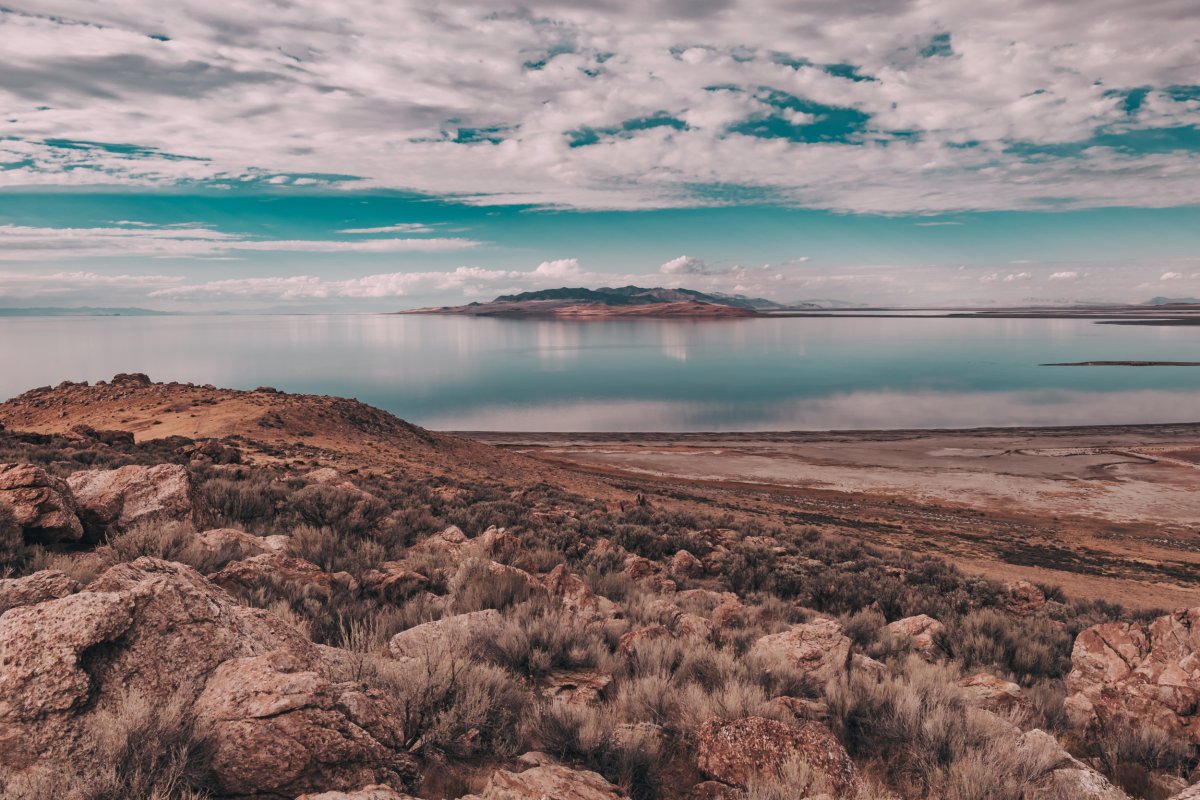The Great Salt Lake should be receiving some much-needed relief as managers are set to release water from Utah Lake.
Utah Lake is a freshwater lake in the Utah Valley. The Jordan River is the lake's only outlet, and a tributary of the Great Salt Lake.
The Great Salt Lake, which is the largest saltwater lake in the Western Hemisphere, has reached historic lows in recent years. In November 2022, the lake reached its lowest level in recorded history at 4,188.2 feet, 17 feet below the level it should be.
Utah Lake has now reached near-maximum capacity, standing at 98 percent, data from the Utah Division of Water Resources reported.

And, to avoid its levels rising anymore, officials have decided to open the flood control dates and release water downstream to the Great Salt Lake, providing it with much needed relief.
These releases are set to begin today, February 8, state engineer and director Teresa Wilhelmsen of the Utah Division of Water Rights said in a statement on Wednesday.
It is not yet clear how much of the Great Salt Lake will rise with these water releases from Utah Lake.
Utah has suffered from severe drought conditions in recent years, which is largely why the Great Salt Lake is seeing such low levels.
However, over the past year, the Western U.S. has seen a rare influx of rain and stormy weather. This has increased precipitation in the surrounding mountains.
The reservoirs in the state are fed through snowmelt from these mountains, meaning that a lack of snowpack equals low water levels.
But at the moment Utah is seeing healthy snowpack levels. According to data from the Natural Resources Conservation Service, the snowpack is currently at 10.5 inches.

The increased snowpack levels over the past year have meant that most of Utah's reservoirs are at healthy levels.
Officials keep a close eye on water levels purely for this reason. If one reservoir gets too full, there is risk of flooding, but this water can be of use to other lakes.
A similar experiment was initiated last year, from another Utah reservoir, Lake Powell. Last April, officials released water from the lake's Glen Canyon Dam over a three-day period. This was in order to replenish Lake Mead's water levels. Lake Mead is the largest manmade reservoir in the U.S., and has been a topic of serious concern as its water levels are at around 30 percent of its full capacity.
This experiment followed a period of extremely high snowpack levels. As the weather warmed, reservoirs across the West saw some much needed water flows.
It is especially important to keep the Great Salt Lake at healthy levels.
This is because, if it continues to dry up, it could pose a number of dangers to the state. Not only does it provide water for farming and human consumption, it's also important to the local climate and surrounding ecosystems.
If the levels get really low, it could also cause dust pollution, which can be harmful to human health.
The Great Salt Lake could be gone in just 10 years if the situation worsens, experts previously told Newsweek.
"Irrigated agriculture has diverted too much of the river flow that the Great Salt Lake depends on. If we don't increase the amount of water getting to the lake, it could be gone within a decade," Ben Abbott, plant and wildlife sciences professor at Brigham Young University in Utah, previously told Newsweek. "Even those who live far from Utah will be affected if we lose the lake. Industry and agriculture across the country and beyond depend on magnesium and fertilizer from the Great Salt Lake, and it is the most important inland wetland in the western U.S."
Correction, 2/12/24 4:38 a.m ET: This article was changed to correct an affiliation and to state that Utah Lake's levels were at 98 percent capacity.
Do you have a tip on a science story that Newsweek should be covering? Do you have a question about the Great Salt Lake? Let us know via science@newsweek.com.
Uncommon Knowledge
Newsweek is committed to challenging conventional wisdom and finding connections in the search for common ground.
Newsweek is committed to challenging conventional wisdom and finding connections in the search for common ground.
About the writer
Robyn White is a Newsweek Nature Reporter based in London, UK. Her focus is reporting on wildlife, science and the ... Read more
To read how Newsweek uses AI as a newsroom tool, Click here.






